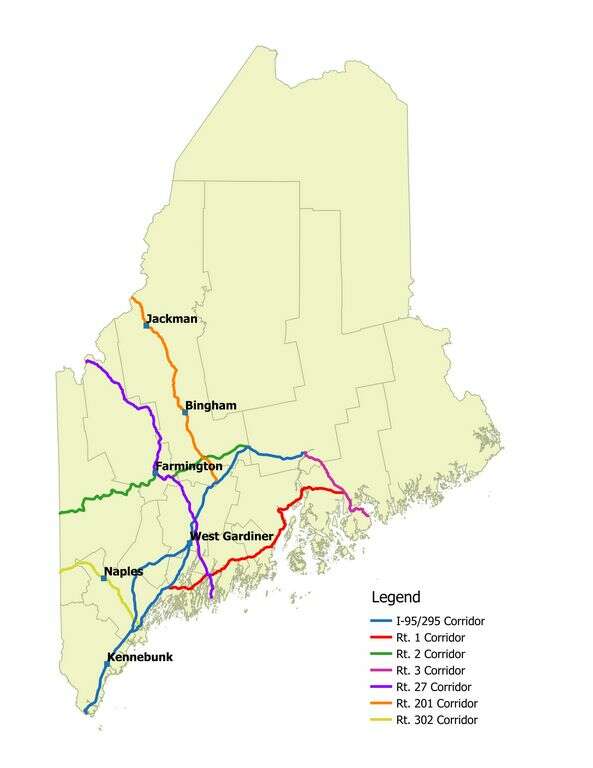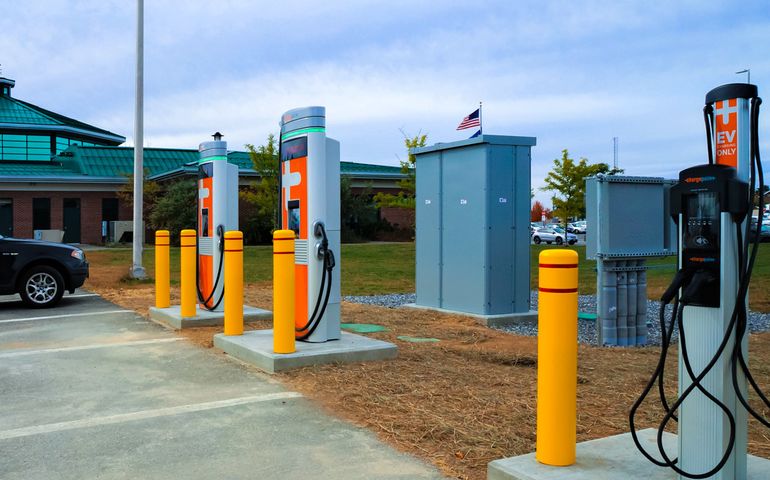
Efficiency Maine caps off first phase of high-speed EV charging network
 Photo / Maureen Milliken
Efficiency Maine has capped off the first phase of its program to add high-speed Level 3 charging stations, which are now at seven sites, including the West Gardiner travel plaza on the Maine Turnpike, seen here, and the most recent ones, in North Windham, completed this week.
Photo / Maureen Milliken
Efficiency Maine has capped off the first phase of its program to add high-speed Level 3 charging stations, which are now at seven sites, including the West Gardiner travel plaza on the Maine Turnpike, seen here, and the most recent ones, in North Windham, completed this week.
More Information
The final piece of the first phase of the state's growing network of publicly accessible electric vehicle chargers took place Monday at the Hannaford supermarket in North Windham.
The completion of the first phase of the program to install high-speed EV chargers along Maine's major routes comes a few weeks after Gov. Janet Mills signed an executive order to accelerate Maine's reduction of greenhouse gas emissions from transportation and to increase the number of EVs on the road by 2030.
Efficiency Maine held a news conference to mark the seventh EV charger installation in a program funded by a settlement from a lawsuit against Volkswagen. The high-speed chargers — also known as Level 3 or DC fast chargers — have also been installed at the Maine Turnpike Kennebunk plazas, both northbound and southbound, and the West Gardiner travel plaza; in Jackman and Skowhegan on U.S. Route 201; in Farmington near the U.S. Route 2 and Route 27 intersection.
The chargers are made by Chargepoint, of California, and installed by Montville-based ReVision Energy. Each location has two of the ultra-fast chargers that can deliver hundreds of miles of range on a single charge of about 15 to 20 minutes. The charging stations differ from the Level 2 ones found at many workplaces or homes, which take up to eight hours to charge a car.
The second phase of the program will begin once contract awards are announced May 12. On April 21, Efficiency Maine closed a request for proposals to for the new installations, which will be along Interstate 95 from Waterville to Bangor, U.S. Route 1 from Rockland to Ellsworth and in Lewiston-Auburn.
The program is being paid for with some of the $5.1 million the state won in a lawsuit against Volkswagen in 2018 over the German auto maker's concealment of diesel truck emission data. Part of the settlement, which overall was $157 million to 10 states, is that the money would be used to focus on electric vehicle support and development.
Part of clean transportation roadmap
Emissions from transportation are the source of more than half of all greenhouse gas emissions in Maine, according to state and environmental officials. Reducing them is a key piece of Maine’s overall effort to curb state emissions by 45% by 2030. The state estimates Maine needs 219,000 light-duty EVs on the road by 2030 to meet its emissions targets.
EVs account for fewer than 1% of registered vehicles in Maine, but the number is expected to grow rapidly with advancing technology, reductions in cost, increasing consumer demand and commitments from the federal government, state governments and major auto manufacturers to accelerate the transition to EVs.
On April 5, Mills signed an executive order calling for a “clean transportation roadmap," due by December, that will develop recommendations to enhance the EV market in Maine, expand charging infrastructure, and evaluate effects on electric utilities and the grid.
The three-phase high-speed charging plan, unveiled in 2018, is one of several EV initiatives by the state, several funded by the Volkswagen lawsuit. The high-speed charger network is an effort to ensure that anyone driving into Maine with an electric vehicle can cross the state and find chargers, officials said at the time.
Phase 3 of the EV network plan will add strategically located Level 2 chargers to “top up” any electric battery during a brief charging session. The program is one of several the state has initiated in the past three years to up electric vehicle use.










0 Comments